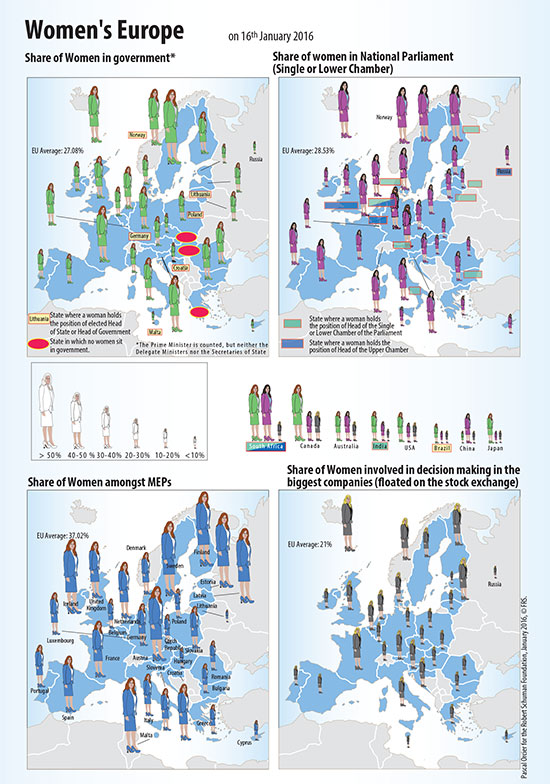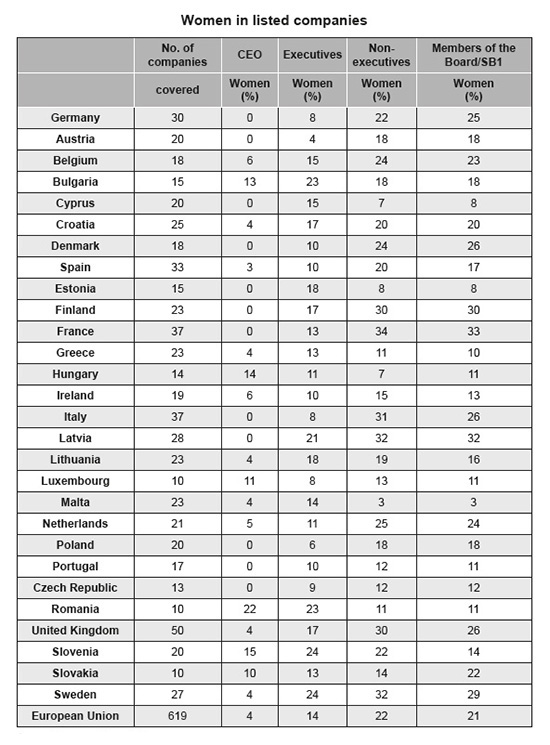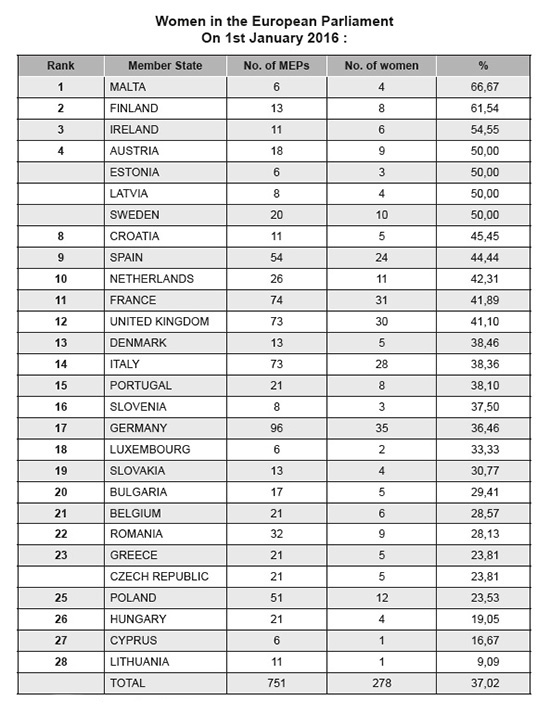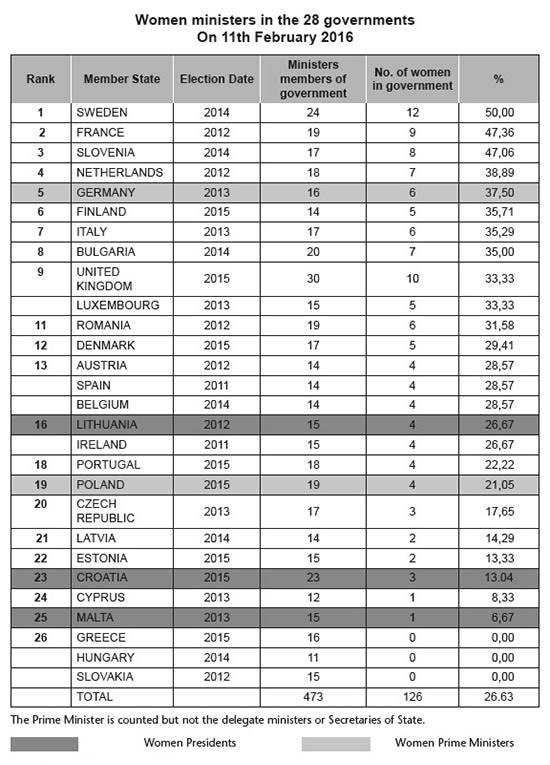supplement
Pascale Joannin
-

Available versions :
EN

Pascale Joannin
In spite of many studies that show that women's involvement and participation in business life would be beneficial to economic performance [3], companies struggle to make this a reality. As a result there is a certain overall sluggishness that typifies Europe in particular. If there were more women in posts of responsibility on this continent would the situation be better? Some would say –undoubtedly -others would answer, not so sure. In any case the means would have to be provided for us to be able to test this.
Mitigated Electoral Results
Many elections took place in Europe this year without any of them leading to any major progress in terms of women's representation in any of the parliaments (the European average is 28.5%) or in the governments (the European average totals 26.6%).
 Source : Compiled by the Robert Schuman Foundation
Source : Compiled by the Robert Schuman Foundation
The year did however start off well with the election of a woman president in Croatia in January: Kolinda Grabar-Kitarovic created a surprise as she beat outgoing president Ivo Josipovic. Was the much expected renewal now happening?
Of course there was action in Greece with the entry into office in January of the radical left coalition led by Alexis Tsipras that was confirmed in September, which must especially be analysed as a victory over the old, outdated parties, notably PASOK. We might have expected a significant breakthrough for women in a far left government that is usually so eager to promote equality. But this was not to be: not a single woman is fully in charge of a ministry!
Then renewal simply came to a halt. Of course here and there, there has been alternation. Outgoing governments have been beaten, for example in Denmark and Poland, leading to the fall of two women Prime Ministers: Helle Thorning-Schmidt and Ewa Kopacz. In the latter case a woman, Beata Szydlo, became Prime Minister, but she is not the leader of the party Law and Justice (PiS), the election's victors. The true leader is Jaroslaw Kaczynski. Will she just be his puppet, his spokesperson or will she really succeed in asserting herself?
Narrow majorities prevented the winning party (Portugal) from staying in power and led to apolitical choices (Croatia) and even forced surprising coalitions (Finland). In Spain, the election was inconclusive and the situation remains uncertain. In all events women have not been winners in these political games away on which citizens are increasingly turning the backs. Might one of the reasons behind this "weariness" not also be the clear lack of female involvement?
Two governments were re-elected in Estonia and in the United Kingdom. In the latter - beyond a clear victory for the Conservatives led by David Cameron, who are no longer tied by a coalition, the other main victor in the election was Nicola Sturgeon, the leader of the Scottish National Party (SNP), the First Minister of Scotland, who made a landslide victory clinching 56 seats of the 59 available in the regional parliament! This victory is also a challenge for the referendum on EU membership that the British Prime Minister aims to organise in 2016. If London wanted to leave, another referendum in Scotland would inevitably be organised. And the United Kingdom could cease to be united.
In the local elections in Spain there was a symbolic victory in the town halls of Madrid and Barcelona by women from the parties of the far left. In France the departmental elections brought 50% of women to office but only 10 women out of a possible 101 to the executive presidency (9.9%); and in the regional elections 3 out of 18 of those elected were women (16,6%) including Valérie Pécresse in Ile-de-France. This is better, but still not enough.
Many are calling for a renewal of old political structures, notably of the traditional parties. Would it be men who will take them over? They sing the virtues of bringing in more young people, but this also quite evidently means involving more women. Young people of course, young women certainly.
Half of the population must be represented, which is not the case at present. There is a dearth of women in the political landscape. There remains Angela Merkel, the German Chancellor, who has caused quite a stir with her positions on Ukraine, the Greek crisis, and especially regarding the refugee issue. She, who knows how to stand up to Vladimir Putin and also to public opinion reminds us of the Union's fundamental values and has shown a great deal of courage and humanity in the ongoing tragic migrant crisis. Is it because she is a woman that the criticism made against her has been so virulent? Her attitude is all the more remarkable since
none of her male counterparts in the Council are any match. Her critics, who are almost Germanophobic at times, do not really seem to affect her.
The main international media were not mistaken when they awarded her several prizes again this year. She was crowned by Time as the most influential personality of the year. Forbes ranked her as the most powerful woman in the world and the Financial Times simply named her personality of the year.
Europe would need several "Angelas" to bring it out of the moroseness in which it finds itself. The problems Europe faces, such as immigration or the fight to counter terrorism can only be solved at European and no longer at national level. Leaders struggle to foresee the changes that this situation will cause and "to think European".
As a result people are wondering what advantage there is in European unification. If women occupied a better place in the Council, in the States' political life things might undoubtedly be different.
Leadership Reaching its Limits
Some emblematic appointments such as that of Delphine Ernotte as the head of the French State TV, that of Véronique Laury as the head of Kingfisher, that of Sophie Bellon as the Head of Sodexo and that of Isabelle Kocher as Managing Director of Engie (formerly GDF-Suez) in May next - show that the doors are opening up more and more to women in business. But appearances can be deceptive and progress quite relative.
Although increasing involvement by women on executive boards of listed companies continues everywhere due to the laws that have imposed quotas, the road to true equality is still long. The average in 2015 in Europe lay at around 21%, ranging from 7.9% in Portugal (PSI-20) to 23.7% in Germany (DAX), 31.4% in the United Kingdom (FTSE 100) and 35% in France (CAC 40). Businesses with the most female involvement are in Norway with 35.5% (OBX). Of course progress has been made in comparison with 2014, as for
example in France, where corporate executive boards amongst the CAC40 comprised on average 35% women in 2015, in contrast to 30% the previous year and those of companies on the SBF 120, 32% in contrast to 29% in 2014. [4]
However amongst the listed companies how many are led by women? [5] Unfortunately we can still count them on one hand in Europe: 5 in the FTSE 100 (5.5%). In Sweden (OMX), there are 7%, in Belgium (BEL 20) 5%, in the Netherlands (AEX) 4% and in Spain (IBEX 35) 3%. Power and hierarchy remain mainly in the hands of the men.
In the USA, women's involvement on executive boards is slightly lower than in Europe (19% on average) but 21 women are at the helm of the major American companies in the S&P 500, which is still only 4.2%. In Canada, women's involvement totals 20.8% (S&P/TSX 60) and in Australia 19.2% (S&P/ASX 200).
Except in Asia, where the situation is more critical, with women's involvement totalling 3.1% in Japan (TOPIX Core 30) and 9.5% in India (BSE 200), one thing is clear: women's involvement on executive boards comes to a halt at around 20%. Again we speak here of listed companies whose situation has improved significantly over the last few years. But what about the other companies?
A great deal remains to be done for the inclusion of women in corporate management. The situation needs to gather pace amongst SMEs and mid-caps which remain very much in the shadows. To this end for example, the law of August 2014 in France extended the quota obligation by 2020 to companies of 250 employees and over. Then in preparation of and to facilitate women's access to the highest positions the contribution they make to the executive company boards should be given more value (audit, remuneration, appointment, CSR, strategy etc.). The following stage would serve to improve women's leadership positions in their role as Chair, CEO, Managing Director so that today's poor performance can be improved. Finally it is difficult to content oneself with the average 20% of women on executive boards. In the UK the goal is now to achieve 30% rate of women on FTSE 100 boards and in France there is a law obliging CAC 40 boards to include 40% of women in varying posts by 2017 with the aim of preventing an accumulation of mandates by the same women. Renewal is therefore vital in the business world as well.
These changes are urgent and necessary when we look at the situation head on. In 2015 more than 90% of executive directors of listed companies were men, few women reach the top of the ladder in their professional areas whatever these might be (medicine, justice, catering, education, university etc.) This is illustrated by the situation in the UK where 91% FTSE 100 executive directors and 95% of the FTSE 250 are men, similarly in universities, where 81% of Vice-Chancellors, 78% of professors and 72% of senior managers are male. Britons are from being exemplary in Europe.
Can we be satisfied with this situation indefinitely? The answer is "certainly not" because it shows that our society is imbalanced and women still struggle to break through into the higher spheres.
When will men understand that they can no longer rule the world alone? [6] Present difficulties can also be explained by the fact that women are far too absent from the decision making processes, but the world will not be able to hold them at bay like this for long.
 Source : European Commission
Source : European Commission
 Source : Robert Schuman Foundation ©
Source : Robert Schuman Foundation ©
 Source : Robert Schuman Foundation ©
Source : Robert Schuman Foundation ©
 Source : Robert Schuman Foundation ©
Source : Robert Schuman Foundation ©
***
Due to its high rank in terms of women's cause Europe should take the initiative and show the way. By finally approving the directive that is still being impeded by the Council, in view of including women on boards across the entire EU so that we can rapidly rise above the present 20%, then 40% and then 50%.; by appointing more women to various positions of responsibility in Europe (DGs, Agencies, EEAS). The European Parliament, which will be the next institution to proceed to the renewal of its bodies, and notably its President at the beginning of 2017, should take the opportunity to elect a woman. Surely Martin Schulz will not be chosen for a third mandate? It would only be the third time since 1979, and it will be exactly 15 years, since the last woman president left her post. With 37% of women in the European Parliament there should be no problem in finding quality female candidates. There are so many to choose from...
[1] : This text will be published in the 10th edition of the Schuman Report on Europe. The State of the Union 2016, Editions Lignes de repères (release in April 2016).
[2] : Number of women MPs according to the Interparliamentary Union: World: 22.6%, America: 27,4%, Africa: 23,4%, Arab States: 19%, Pacific: 13,1%
[3] : On this issue see the OECD's studies - those by the MSCI, McKinsey Global Institute and Grant Thornton.
[4] : See the study by Russell Reynolds Associates
[5] : See the study by MWM Consulting
[6] : On this issue see the UNs HeforShe programme
Publishing Director : Pascale Joannin
To go further
Democracy and citizenship
Radovan Gura
—
25 March 2025
Strategy, Security and Defence
Stéphane Beemelmans
—
18 March 2025
Ukraine Russia
Alain Fabre
—
11 March 2025
Gender equality
Juliette Bachschmidt
—
4 March 2025

The Letter
Schuman
European news of the week
Unique in its genre, with its 200,000 subscribers and its editions in 6 languages (French, English, German, Spanish, Polish and Ukrainian), it has brought to you, for 15 years, a summary of European news, more needed now than ever
Versions :




